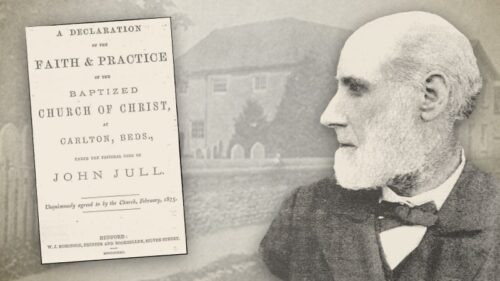John Gill
John Gill (1697-1771) was a Strict and Particular Baptist preacher and theologian. He was appointed the Pastor of Goat Yard Chapel, Horsleydown, Southwark, serving this position for fifty-one years. He was the first Baptist to write an exhaustive systematic theology, setting forth High-Calvinistic views and a clear Baptist polity which became the backbone for the churches subscribing to them.
John Gill, (1) Commentary On First Thessalonians (Complete)
John Gill, (2) Commentary On Second Thessalonians (Complete)
John Gill, (3) Commentary On First Corinthians
John Gill, A Biography By George Ella
John Gill, A Lecture By George Ella
John Gill, Doctrinal And Practical Body Of Divinity
John Gill, Extracts
John Gill, Identifying The Biblical Covenants (Complete)
John Gill, The Cause Of God And Truth
-
Table Of Contents: New Order
As it is my goal to align John Gill’s “Body of Doctrinal and Practical Divinity” with the Framework of Sovereign Grace, I have rearranged the eleven branches of theology, together with the individual chapters, in order to demonstrate how they fit together in the grand scheme of God’s masterplan for the ages. I have reduced the original eleven “Books” (or branches) to three main headings—(1) Of God; (2) Of God’s Revelation; (3) Of God’s Works. I have also reduced the original one hundred fifty-six chapters to one hundred fifty-one, having subtracted the five chapters belonging to the Appendix (a dissertation on the baptism of Jewish Proselytes). Under the first heading, “Of God”, there are thirty chapters. The first nine speak on the Godhead in general,…
-
Table Of Contents: Original Order
John Gill’s “Body of Doctrinal and Practical Divinity” was originally published in four volumes. The first two volumes were published in 1769, and were entitled, “A Body Of Doctrinal Divinity”. They were divided into seven “Books”, each of which dealt with a particular branch of doctrinal theology—Book 1: Of God, His Word, Names, Nature, Perfections And Persons; Book 2: Of The Acts And Works Of God; Book 3: Of The External Works Of God; Book 4: Of The Acts Of The Grace Of God Towards And Upon His Elect In Time; Book 5: Of The Grace Of Christ In His States Of Humiliation And Exaltation, And In The Offices Exercised By Him In Them; Book 6: Of The Blessings Of Grace, And The Doctrines Of…
-
An Introduction To John Gill’s “Doctrinal And Practical Body Of Divinity”
In the year 1999, I became the pastor of Bethesda Chapel, a Strict and Particular Baptist church[1] in London, England. I was a Moderate-Calvinist for the first ten years of my ministry, although I refused to identify with the Reformed Baptist Movement.[2] In the year 2010, the congregation came under internal and external pressures to adopt a plural eldership.[3] I resisted this pressure for scriptural, historical and practical reasons, but at the time, I was not well informed on the issues. Three years later, I completed an exhaustive study on the subject, resulting in an unpublished book, in excess of a thousand pages. My initial resistance to the Reformed Baptists’ views on plural elderships was confirmed and staunchly defended. It was at that time, early…
-
Title Page And Preface
A Body Of Doctrinal And Practical Divinity Or, A System Of Practical Truths Deduced From The Sacred Scriptures By John Gill 1815 Preface John Gill was born in Kettering, Northamptonshire, England, on November 23rd, 1697. At age 12, he was converted to Christ under the preaching ministry of William Wallis. However, he waited six years before agreeing to be baptized, after which he became a member of his local church. At the age of 23, he was inducted as pastor of the Strict and Particular Baptist Horselydown church, the office of which he held until his death on October 14th, 1771. His 50 year pastoral ministry was accompanied by a prolific written ministry. He was the first Baptist to write an exhaustive theological treatise, which…
-
Part 1 – (4) Deuteronomy 8:2
“And thou shalt remember all the way which the LORD thy God led thee these forty years in the wilderness, to humble thee, and to prove thee, to know what was in thine heart, whether thou wouldest keep his commandments, or no.”—Deuteronomy 8:2 It is said,[1] that it is evident from this and other passages of Scripture, that the state of man in this world, is a state of trial or probation. It will be proper therefore to make the following inquiries: I. What this state of probation is, or what is meant by it. 1. This state of trial is not of men's graces, as faith, patience, etc., by afflictive dispensations of Providence; for men in general are not in such a state, since…
-
Part 1 – (3) Deuteronomy 5:29
“O that there were such an heart in them, that they would fear me, and keep all my commandments always, that it might be well with them, and with their children for ever!”—Deuteronomy 5:29. I. These vehement desires of God for the good of these people, are said to be irreconcilable with his decrees of election and reprobation; and supposing those decrees, they are represented[1] to be hypocritical: to which may be replied: 1. For God passionately to wish good things, even salvation itself, for some, and not for all, is no ways contrary, but perfectly agreeable to the doctrine of election. If any thing is said to the purpose, as militating against that doctrine, it ought to be said and proved, that God has…







